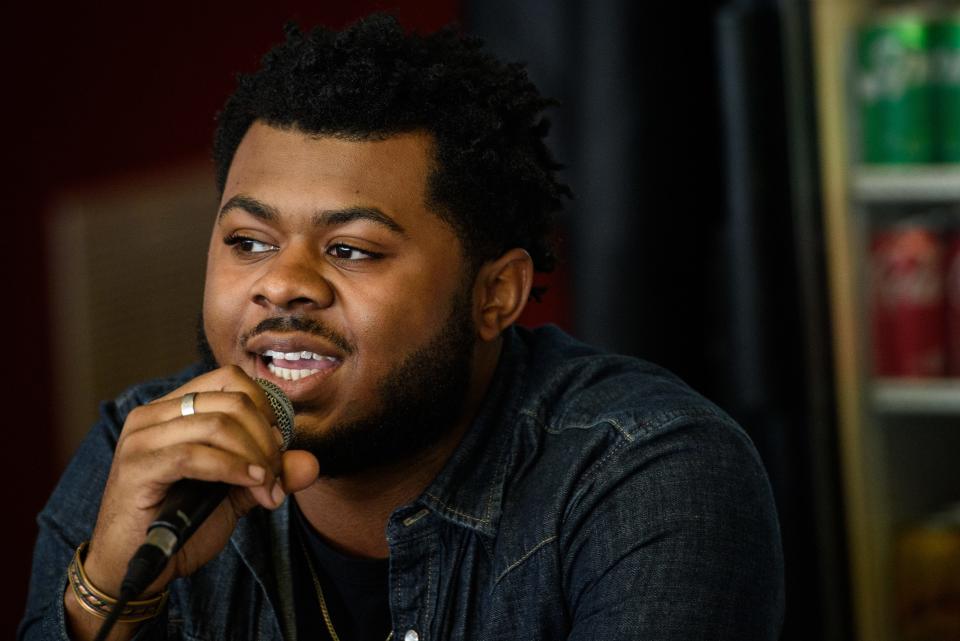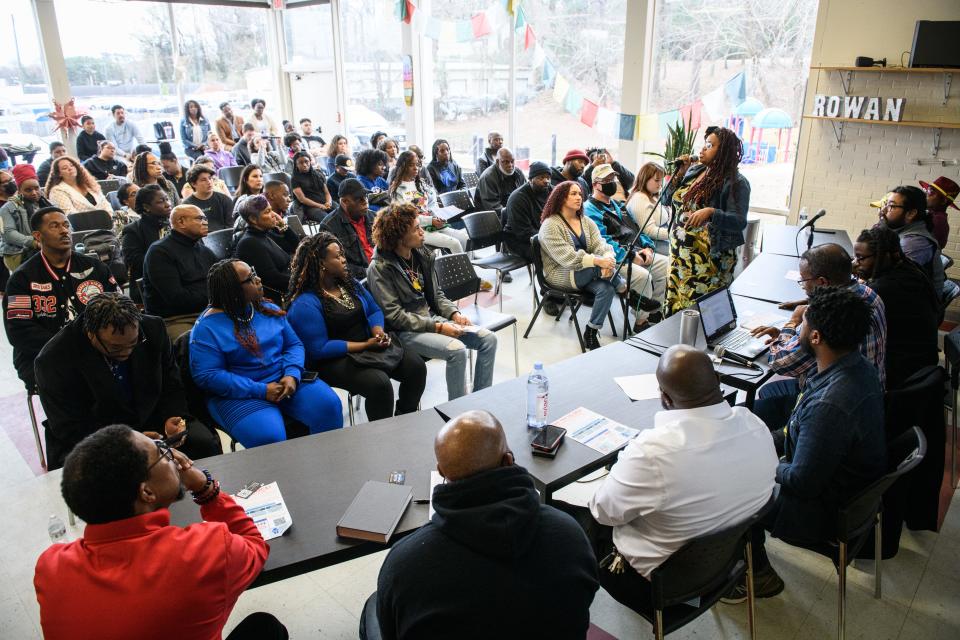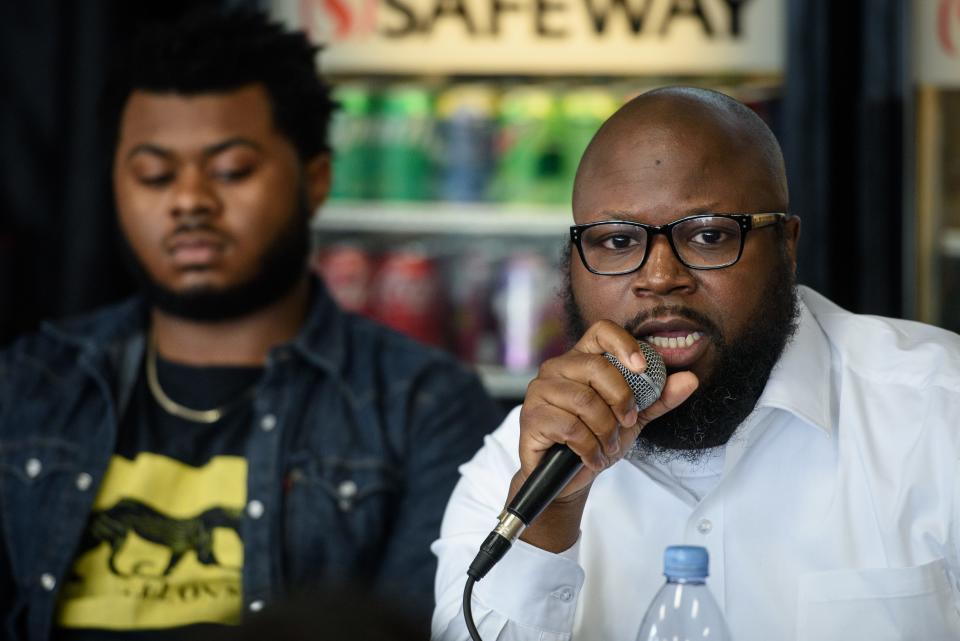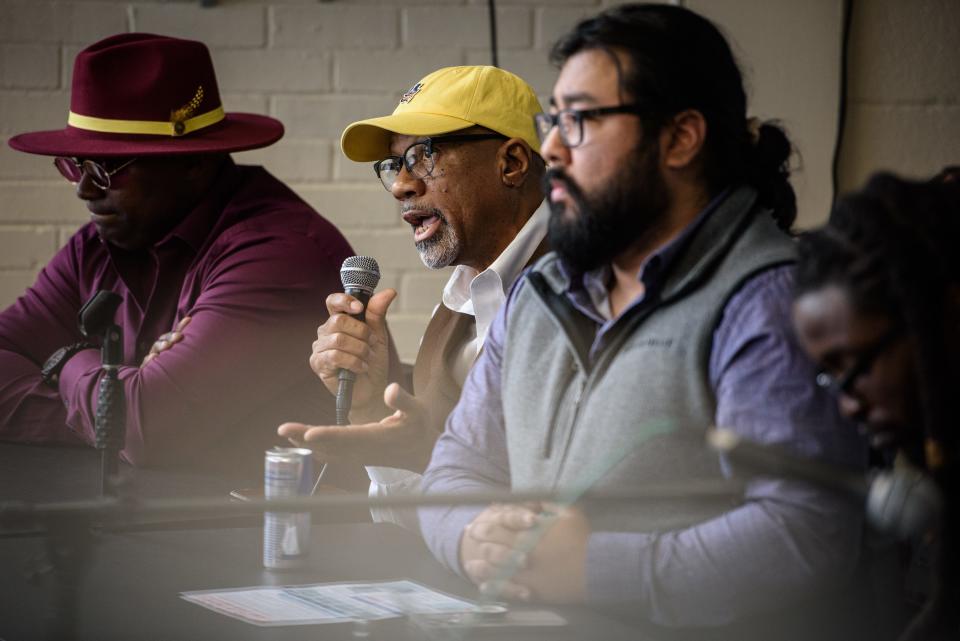Fayetteville discussion brings calls to action in wake of Tyre Nichols' death
Dozens gathered at Rowan Skate Park in Fayetteville on Saturday for an emotional discussion on the impact of Tyre Nichols’ killing on the Black community.
Community Conversations: A Panel Discussion, began at noon and featured eight panelists. The discussion was organized by Fayetteville Observer opinion columnist Rakeem “Keem” Jones and moderated by opinion editor Myron B. Pitts. An hour before the event, at least 25 skateboarders rode from the Market House to the skate center in honor of Nichols, also a skateboarder. Nichols was fatally beaten by multiple Memphis police officers during a traffic stop in January, and five officers face second-degree murder charges in his killing.
The panel lasted about two hours and covered topics like police brutality, police reform, community engagement and activism.
The panelists
The panelists at Saturday’s discussion were:
Mario “Be” Benavente, Fayetteville City Council member representing District 3
Kevin Brooks, founder of the Group Theory and the PROOVE Project
Dr. Matthew Fogg (via Zoom), retired chief deputy U.S. marshal; CNN and MSNBC law enforcement analyst; and author of “Bigots with Badges”
Shaun McMillan, community advocate and co-founder of Fayetteville Police Accountability Community Taskforce
Archbishop J. Antoine Miner Sr., executive director of EMPACT One Foundation
Christian Mosley, host of Berean Talk and co-founder of Cora’s Community Foundation
Troy Williams, Observer columnist, legal analyst and criminal defense investigator
Tony U. Brown, chief executive officer of Southern CC Inc.
Lillian Glass (via Zoom), body language expert and filmmaker of “De-Escalation”
Reactions to the video
The panel first discussed the emotional impact of the footage of Nichols’ beating, which was released to the public by the Memphis Police Department on Jan. 27. Attendees watched a 24-second clip of Nichols’ beating before the panel began.
Panelist Tony Brown said he was hurt by the video.
“It looks more personal than anything,” he said. “Some people put on a uniform to protect and serve. Others use it as a means to abuse their power.”
Panelist Troy Williams, who said he had a background in law enforcement, called Nichols’ killing the “most egregious event I’ve ever seen.” Williams said he worked with federal law enforcement officers before and he believed problems with brutality and excessive force are more common at the local level.
Several panelists, including Mario Benavente and Christian Mosley, said Nichols’ death was the result of systemic racism.
“I’m not surprised,” Mosley said. “That’s what they’re supposed to do.”

Other panelists said the incident served as a reminder of how easily they could be in Nichols’ position. Jones said he experienced similar situations with police officers before and wondered how Nichols felt in that moment.
“I just didn’t die,” Jones said. “It could’ve been me.”
Audience members who spoke during the panel expressed their disgust and concern at the footage of Nichols’ killing. Lisette Rodriguez, a Fayetteville native and community activist, said she cried all night after watching the video and didn’t think progress was truly possible for the police.
“It is the system. It is a system that was built to round up slaves,” Rodriguez said firmly. “We can’t reform this.”
Several attendees told the panel widespread understanding of Black history was crucial to effect change. Carrie Jackson stepped up to the microphone to urge the crowd to vote and be engaged in the community.

“It’s systemic because of legislation,” Jackson said. “There’s a lot of our history that has been washed away.”
Dorrance Kennedy, a professor of social work at Fayetteville State University, emphasized the importance of that history. He said it was crucial for younger people to engage with older community members who also fought for progress and highlighted the tragic irony of Nichols’ killing.
“You’re killing your brother in the city where Martin Luther King Jr. was assassinated,” Kennedy pointed out.
Race and justice
Panelists next tackled the question of whether race played a role in the officers in Nichols’ killing being held accountable. The officers’ charged in Nichols’ death were all Black.
Panelist Lillian Glass, the daughter of two Holocaust survivors, compared the attack to Jewish people beating their fellow Jews during the Holocaust.
“We need to start with the lack of humanity,” Glass said.
Others said they did not know if race played a role in the implementation of justice but pointed to areas of focus to prevent further tragedies. Panelist Shaun McMillan said he felt the officers would not have been held accountable if not for their actions being captured on a nearby mounted camera. McMillan pointed out that in North Carolina, body camera footage cannot be released without a court order — something he said residents should work to change.
“Why are we paying for body cameras if we can’t see the truth?” he asked.
Panelist J. Antoine Miner Sr. said he viewed the killing as something carried out by “idiots,” not necessarily a consequence of systemic racism. He questioned whether the Black community expressed outrage in the same way for those killed by average people outside of law enforcement.

“Before we protest down at the police department, go protest down at Murchison Road,” Miner said. “I have no time for false outrage.”
Mosley said cries of “Black Lives Matter” meant little when attention only centered on the deaths of Black people, not around issues impacting their daily lives.
“You need to be concerned about Black hunger just as much as you are about Black death,” he said. “Miss me with the Black Lives Matter. Black death matters.”
Mosley and Benavente both tackled the topic of Black-on-Black crime, saying the issue was often used to divert attention from the impact of systemic racism. Mosley said people of all races are simply more likely to kill people they encounter every day in their communities, citing a statistic that 68% of white people are killed in homicides by other white people.
Benavente said Black people killed by police garner more attention because police officers are often given qualified immunity and do not face the same consequences as the average person.
“The myth of Black-on-Black crime demonizes the community,” Benavente said.
As panelists and audience members alike brought up topics like the justice system, education, poverty and civic engagement, Pitts encouraged attendees to reflect on how the subjects were intertwined.
“Everything we’re talking about is connected,” he said. “That’s why it’s not just one solution.”
Final thoughts
As panelists gave their closing statements, teamwork and community engagement were common themes.
“It takes a village to raise a child, but we’re not realizing we’re a village,” Brown said, encouraging audience members to spend more time with the children in their community.

Williams promoted an “intergenerational approach,” while Benavente said he was inspired by younger community members who could change Fayetteville for the better.
“A lot of stuff I find myself having to slow-walk my colleagues through, you guys already get,” Benavente said, speaking to younger members of the crowd. “The status quo isn’t working for everyone.”
Mosley instructed attendees to read up on systemic racism and use their voices.
“Do not be afraid to stand up for yourself and your people,” he said. “You’re either going to fight for your freedom or die talking about it.”
McMillan called the panel a “dress rehearsal” for future activism, encouraging audience members to attend City Council meetings and speak up. He said he supports Benavente’s call for an Office for Community Safety that would reduce police interactions with the community and hold officers accountable.
“They don’t need to police themselves. They’re incapable,” he said.
Kevin Brooks closed with a message of hope.
“There is progress that can be made, and the foundation is already there,” he said.
Public safety reporter Lexi Solomon can be reached at ABSolomon@gannett.com.
This article originally appeared on The Fayetteville Observer: Fayetteville calls for change at Community Conversations panel

